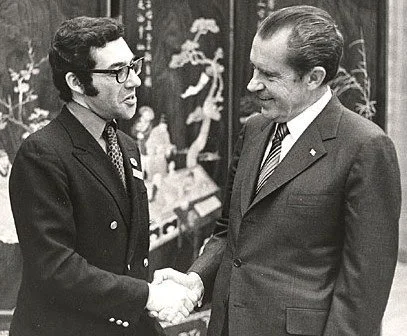In the last month of 1973, Congress confirmed the appointment of Gerald Ford as Vice President. He was considered a compromise candidate, seen as not being in Nixon's camp but also being too weak willed to seek the presidency for himself. By the start of 1974, the pressures of the continued Watergate investigation were beginning to take their toll on Nixon. He was losing sleep and drinking heavily, and many of his aides were privately discussing what to do if Nixon had a mental breakdown. To make matters worse, the new Special Prosecutor was even more willing to play hardball against Nixon than his predecessor, opening lines of investigation into Nixon's accepting of gifts while president and possible tax evasion.
In March, seven former Nixon aides were indicted by a grand jury based on evidence collected by the Special Prosecutor. The indictment included a sealed document that named Nixon as an unindicted co-conspirator. In the end, the Special Prosecutor had persuaded the grand jury not to indict Nixon, claiming that a President could only be indicted after leaving office. Instead, the sealed document was delivered to the House Judiciary Committee which sat on it for more than a month as they reviewed its contents. Though the House was majority Democrat at the time, many of the committee’s members felt that there was not enough evidence to overwhelm Nixon's support.
Things changed in April. The Special Prosecutor was finally able to get the courts to order Nixon to hand over the White House tapes. However, instead he released 1,200 pages of transcripts edited for curse words, of which there were plenty. As the battle raged on, the American media and public poured over the released transcripts. Though they contained no smoking gun, they did create a picture of a devious and immoral man who was contemptuous of his own country, its institutions, and its people. Nixon's public support collapsed, the House Judiciary Committee began impeachment hearings, and prominent members of Nixon’s own party began suggesting that he should resign. The battle over the tapes and Nixon's executive privilege stretched all the way to the Supreme Court, which by the end of July, in a unanimous decision, ordered Nixon to release all of the tapes. It proved to be the end for the beleaguered president. Amongst the tapes were recordings that showed that not only had Nixon known about the break-in since just a few days after it had happened, but that he had also personally okayed legal payments to the five burglars in exchange for their silence.
Soon after the release of the tapes, the House Judiciary Committee voted to impeach the president on the grounds of obstruction of justice, abuse of power, and contempt of Congress. If it was passed by the full House, then the Senate would be able to impeach the president by a two-thirds vote. Republican leaders met with the president and told him he most certainly would be impeached if he didn't resign. Drunk and tired, Nixon took their advice and resigned on August 9, the first president to ever do so.
With Nixon's resignation, the impeachment hearings came to an end, but possible criminal investigations continued. However, these were ended when Gerald Ford granted Nixon a presidential pardon in September. Though Ford claimed he did it so the country could move on, critics argued that Ford had promised the pardon to get Nixon to resign. The whole mess resulted in a new investigation by the House Judiciary Committee, but in the end nothing came of it. In total, 69 members of the Nixon administration and re-election campaign were indicted, of which 48 spent time in prison. The whole episode soured the public on the Republican party, allowing the Democrats to increase their majorities in both the House and Senate. The Democrats would maintain their majority in the Senate until 1981 and in the House until 1995 (though to be fair they had held majorities in both since 1955). The Democrats used their greater majorities to pass several bills limiting executive power, all of which would later be walked all over or ignored by both Republican and Democratic presidents. Due to the unpopularity of his pardon of Nixon, Gerald Ford lost the 1976 presidential election to Jimmy Carter. Prior to Nixon, both Kennedy and Johnson had recorded many of their conversations. After Watergate, not a single president has supposedly taken back up the practice. Nixon spent the rest of his life claiming his innocence, dying in 1994.
Image: https://commons.wikimedia.org/wiki/File:Nixon-depart_crop.png



